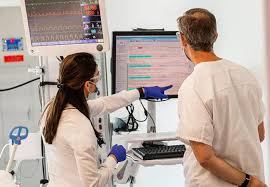Table of Contents
Introduction

The healthcare landscape is in constant flux. Technological advancements, the rise of healthcare costs, and an aging population are all contributing to a rapidly changing environment. This complex landscape calls for innovative solutions, and the nurse informatics career path is emerging as a pivotal force in meeting these challenges.
The Nurse Informatics Hero Emerges
Nurse informatics is a dynamic field that bridges the gap between clinical expertise and technology. Nurse informaticists are healthcare professionals who leverage technology to improve patient care, optimize workflows, and analyze data. They are essential in ensuring the smooth operation and efficient use of electronic health records (EHRs), healthcare information systems, and other digital tools.
Why Champion the Future?
The nurse informatics career path directly impacts patient care. By analyzing data trends, identifying potential risks, and optimizing clinical processes, nurse informaticists help to:
- Improve Patient Outcomes: Data-driven insights enable better treatment plans, early intervention, and proactive care management.
- Streamline Workflows: Efficient EHR systems and digital workflows reduce administrative burdens on nurses, allowing them to focus on direct patient care.
- Reduce Healthcare Costs: Data analysis can identify inefficiencies, leading to cost savings and more effective resource allocation.
A Lucrative and Rewarding Path

The demand for qualified nurse informaticists is booming. As healthcare systems increasingly rely on technology, the nurse informatics career path offers competitive salaries and ample career advancement opportunities. This field is not only lucrative but also deeply rewarding, as it allows professionals to make a tangible difference in the lives of patients.
Is Nurse Informatics Right for You?
A successful nurse informatics career path requires a unique blend of skills and attributes:
- Clinical Expertise: Strong nursing knowledge and experience are fundamental to understanding the clinical implications of data and technology.
- Analytical Skills: The ability to interpret data, identify patterns, and draw meaningful conclusions is essential.
- Technological Proficiency: A passion for technology and a willingness to learn new software and systems are key.
- Communication and Collaboration: Effective communication skills are vital for collaborating with diverse healthcare teams and explaining complex technical concepts.
Nurse Informatics Career Path

Educational Foundation
- Traditional RN to BSN Path: For aspiring nurse informaticists, a Bachelor of Science in Nursing (BSN) degree is typically required. Many registered nurses (RNs) obtain their BSN through traditional programs or accelerated online options to propel students to the nurse informatics career path.
- Master of Science in Nursing Informatics (MSN-IN): The MSN-IN program provides specialized training in healthcare informatics. Curriculum typically includes courses on:
- Healthcare Information Systems
- Data Analysis and Statistical Concepts
- Informatics Theory and Principles
- Project Management and Implementation Strategies
- Legal and Ethical Considerations in Informatics
- Clinical Informatics Applications
Certifications and Continuing Education
- Certified Nurse Informaticist (CNIO): The CNIO credential demonstrates specialized knowledge and competence in nurse informatics. It requires a combination of education, experience, and exam success.
- Continuing Education: The nurse informatics career path demands ongoing professional development to stay abreast of rapidly evolving technologies. Conferences, webinars, and online courses are valuable resources for staying current are crucial for the nurse informatics career path.
Experience Matters
- RN Experience as a Springboard: Strong clinical experience in various healthcare settings provides a valuable foundation for understanding the nuances of patient care and workflow processes, crucial for a nurse informatics career path.
- Building Your Informatics Expertise: Entry-level roles in nurse informatics career pathcan include:
- Clinical Informaticist: Focusing on implementing and optimizing EHR systems within a specific clinical department.
- Project Manager: Overseeing the implementation and maintenance of healthcare information systems.
- Data Analyst: Collecting, analyzing, and reporting data to identify trends and improve decision-making.
Career Trajectory and Specialization

- Diverse Career Options: The nurse informatics career path offers a wide range of opportunities in various settings:
- Hospitals and Clinics: Working directly with clinical teams to improve patient care and optimize workflows.
- Public Health Agencies: Utilizing data to identify health trends and implement public health initiatives.
- Consulting Firms: Providing expertise in healthcare information systems and technology to various organizations.
- Software Development Companies: Contributing to the development of healthcare software solutions.
- Specialization Opportunities: Nurse informaticists can specialize in specific areas:
- Clinical Documentation Improvement (CDI) Specialist: Ensuring accurate and complete medical documentation for improved data quality and reimbursement.
- Telehealth Informaticist: Supporting the development and implementation of telehealth solutions for remote patient care.
- Nursing Informatics Research: Conducting research to advance the nurse informatics career path and inform best practices.
Thriving as a Nurse Informaticist

Essential Skills for Success
Essential Skills for Success
While a strong clinical foundation is essential, nurse informaticists need a diverse skillset to excel in their roles. Here are some key areas that will equip you for success:
- Communication and Collaboration: Nurse informaticists act as liaisons between clinical and technical teams. Exceptional communication skills are crucial to bridge the gap, clearly explain complex technical concepts to nurses, and articulate clinical needs to IT professionals. Collaboration is equally important to work effectively with diverse stakeholders and ensure successful implementation of new technologies.
- Critical Thinking and Problem-Solving: Healthcare is constantly evolving, and nurse informaticists must be adept at identifying problems within healthcare systems and workflows. Strong critical thinking allows you to analyze data, troubleshoot issues with technology, and develop innovative solutions to improve patient care.
- Project Management: Many nurse informaticists are involved in implementing new technologies or optimizing existing systems. Project management skills are essential to keep projects on track, manage resources effectively, and ensure successful outcomes.
- Data Analysis and Interpretation: The ability to analyze and interpret healthcare data is crucial. Nurse informaticists often need to draw insights from patient records, clinical data, and other sources to identify trends, monitor performance, and make data-driven decisions to improve care delivery.
- Technical Expertise: While in-depth programming knowledge may not be required for all nurse informaticists, a strong understanding of healthcare information systems (HIS), electronic health records (EHR), and other relevant technologies is essential. This allows you to effectively utilize these tools, identify potential issues, and work collaboratively with IT teams.
Leadership and Advocacy
Nurse informaticists often play leadership roles within healthcare organizations. They champion the adoption of new technologies and advocate for data-driven decision-making, influencing the direction of healthcare innovation.
Nurse informaticists are not simply technology experts; they are also leaders and change agents within healthcare organizations. Here’s how you can leverage your unique skills to drive innovation:
- Championing Evidence-Based Practice: By analyzing data and identifying areas for improvement, nurse informaticists can advocate for evidence-based practices and new technologies that can optimize workflows and improve patient outcomes.
- Leading Change Initiatives: Implementing new technologies often requires change management strategies. Nurse informaticists, with their understanding of both clinical needs and technological capabilities, can effectively guide healthcare teams through change and ensure successful adoption of new systems.
- Promoting Collaboration: Nurse informaticists can bridge the gap between clinical and IT departments, fostering collaboration and ensuring that technology solutions truly meet the needs of healthcare professionals at the bedside.
Staying Ahead of the Curve
The nurse informatics career path requires continuous learning to adapt to emerging technologies, such as:
- Artificial Intelligence (AI): AI applications are revolutionizing diagnostics, personalized medicine, and healthcare efficiency.
- Big Data: Analyzing large datasets to identify patterns and predict health outcomes.
- Telehealth: Expanding access to healthcare through virtual consultations and remote monitoring.
The healthcare landscape is constantly evolving, driven by technological advancements. Here’s how to stay relevant and adaptable:
- Continuous Learning: Embrace a growth mindset and commit to lifelong learning. Participate in professional development courses, attend conferences, and stay updated on emerging technologies like artificial intelligence (AI), big data analytics, and telehealth, which are shaping the future of healthcare.
- Embrace New Technologies: Don’t shy away from learning new technologies. Explore online resources, take certification courses, and participate in pilot programs to gain experience with emerging tools and platforms.
- Become an Authority: Consider sharing your knowledge by authoring articles, presenting at conferences, or mentoring other aspiring nurse informaticists. This keeps you engaged with the latest trends and allows you to contribute to the field’s advancement.
Building a Network and Finding Mentorship
Connecting with other nurse informaticists through professional organizations, online communities, and industry events is essential for career growth. Mentorship from experienced professionals provides valuable guidance and insights.
Building strong connections within the nurse informatics community can significantly enhance your career. Here are some ways to do so:
- Professional Associations: Join professional organizations like the American Nurses Association (ANA) Informatics Specialty and the Healthcare Information and Management Systems Society (HIMSS). These organizations offer networking opportunities, educational resources, and career development support.
- Online Communities: Engage in online communities for nurse informaticists. These forums provide opportunities to connect with colleagues, ask questions, and share experiences.
- Mentorship: Seek guidance from experienced nurse informaticists. Their mentorship can provide valuable insights, career advice, and support in navigating the field.
Conclusion
The nurse informatics career path holds immense potential for impacting the future of healthcare. By bridging the gap between clinical expertise and technology, nurse informaticists are transforming patient care, improving workflows, and driving innovation within the healthcare system.
Embrace the Challenge, Champion the Future
For nurses seeking a challenging and rewarding career path, nurse informatics offers a unique opportunity to shape the future of healthcare.
If you are passionate about technology, driven by a desire to improve patient care, and eager to champion innovation, consider embarking on a nurse informatics career path. The future of healthcare is being shaped by technology, and nurse informaticists are leading the charge. Embrace the challenge, champion the future, and embark on a fulfilling nurse informatics career path.
Remember: Seeking help is a sign of strength, not weakness. It shows that you’re dedicated to your education and committed to your future success in nurse informatics.
Don’t let challenges hold you back. Reach out to us for support and continue on your path to becoming a skilled and impactful nurse informaticists!







